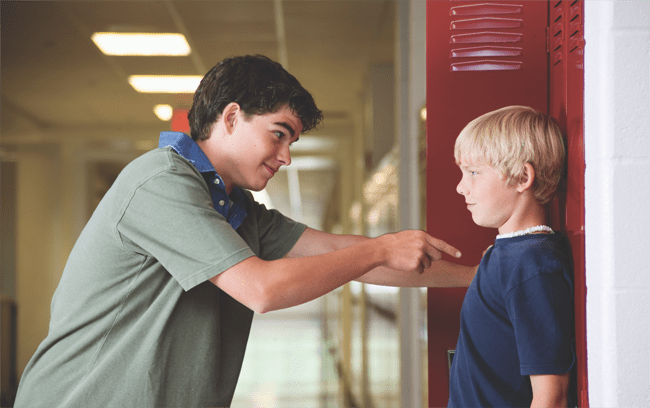
It is important for adults to understand and recognize if a child shows signs of being a bully, or signs of being bullied, and how to appropriately intervene. But understanding the outward behavior and/or often-implied signals associated with either bullying or being bullied can be difficult and frustrating for parents, teachers, caregivers, etc. Ideally, a child being bullied or would share his/her concerns openly, but, too often, this is not the case.
Bullying in schools often takes place in unsupervised locations; such as bathrooms, busy hallways, lunchrooms, and school buses. The victim may feel that even if he speaks up, nothing may be done to help. This is why it is important for schools and parents to have policies in place and frequent discussions regarding bullying and its consequences. Discussions should include the definition of bullying and the difference between discussing/reporting an incident, vs. “getting someone in trouble,” or “tattling.”
While both parents and educators set goals to create safe spaces for children to grow and feel comfortable, many children do not send direct, verbal messages that they are being bullied. Factors involved are usually fears associated with feeling judged, rejected, being a “snitch,” and/or being misunderstood, all of which make matters worse for themselves and leads to feelings of isolation and a lack of support. This is why it is so important that parents and educators are aware of the less subtle signs that a child is being bullied or is bullying others.
Read Next | How To Monitor and How to Prevent Cyberbullying
Signs of being bullied:
- Avoiding school or extracurricular activities that were once enjoyed; arriving home unusually late or early (by avoiding regular routes); no longer wanting to ride on the school bus
- Decreased/withdrawn time spent with friends; lack of friends
- Increase in anxiety/worry; appearing stressed; trouble sleeping, thus appearing more tired than usual; decrease in appetite
- Sudden decrease in academic performance
- Complaints of physical ailments (i.e. headaches, stomach aches); unexplained injuries
- Low self-esteem
- Loss of personal items
Signs of bullying others:
- Physically or verbally aggressive behavior; appearing angry or edgy
- Lack of empathy
- Defiant, impulsive and insistence on getting her way
- Low self-esteem
Bullies are, more often than not, products of their own environment. For example, if a child is being bullied at home by another family member, he may repeat this behavior in school. The child may also adopt the negative assumption that aggressive behavior or language will lead to getting her way, resulting in feelings of power. This is a negative reward (reinforcing the negative behavior). It is important to be aware of how we conduct conversations in the home. Those young ears are always listening and learning from example. Effective communication skills/problem solving skills are pertinent to reducing fear or intimidation. Effective family communication means allowing all members of the family to express their emotions appropriately and be heard.
As a parent or teacher, it is important to recognize inappropriate behavior and set limits as to what is acceptable and unacceptable. Teach children about bullying at a young age and help them understand that they are accountable for their actions as they grow and learn. Challenge them to think critically about the act of bullying and how they can problem-solve effectively, instead of acting on impulse.
The parent/teacher should always aim to be a positive role model in the home and at school. Try to create safe spaces by promoting self-esteem and reassuring the child that you will always listen and help. Role-play scenarios and discuss conflict resolution skills. Discuss how they can diffuse a situation and walk away. Talk about how to be inclusive with other peers.
If you are concerned or suspect your child is being bullied, or is bullying others, either in school or in the community, speak with school teachers, administrators, and mental health professionals. Encourage your child to confide in a trusted adult or a mental health professional. Remember that “consistency is key” and assure your child that there is always someone willing to listen and help.
By Lori Faicco, LMHC-licensed mental health counselor, Staten Island Mental Health Society, Inc.

Read Next | This Is Everything You Need to Find an Amazing Summer Camp Program in Staten Island



